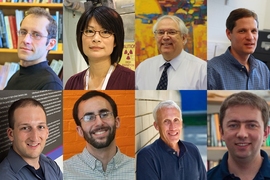MIT Department of Nuclear Science and Engineering (NSE) graduate student Carolyn Coyle was a winner of the NURETH-16 (American Nuclear Society International Topical Meeting on Nuclear Reactor Thermal Hydraulics) Young Professional Award and was one of eight winners of the Best Paper Award for her paper entitled “Synthesis of CRUD and its Effects On Pool and Subcooled Flow Boiling.”
Coyle’s work with Professor Jacopo Buongiorno, Tom McKrell, and Bren Phillips focuses on the effects of Chalk River unidentified deposits (CRUD) on critical heat flux (CHF) and heat transfer coefficient (HTC). CRUD is a naturally occurring porous, hydrophilic layer that forms on fuel rods during reactor operation. CRUD deposits can have large effects on CHF and HTC. Coyle investigated these effects by preparing synthetic CRUD on indium tin oxide-sapphire heaters. Information about the heater surface temperature, nucleation site density, bubble departure diameter, and bubble departure frequency was monitored and collected in the pool and flow boiling facilities in MIT’s Reactor Hydraulics Laboratory.
The purpose of the student program is to encourage the active participation of students by submitting high-quality technical papers on the various aspects of nuclear thermal hydraulics. NURETH-16 awarded travel fellowships for the top student papers, undergraduate or graduate.
NURETH-16 was dedicated to NSE Professor Mujid Kazimi (1947-2015), a renowned scholar, educator, and researcher in nuclear technology, and leading expert in the design and analysis of nuclear power plants and the nuclear fuel cycle. An ad-memoriam session was held on Tuesday, Sept. 1, to celebrate his contributions to making nuclear power safer, more reliable, and available to all.









